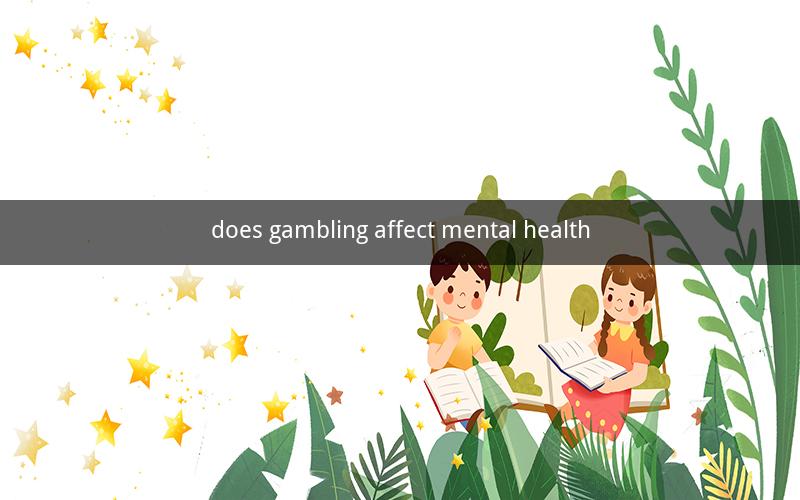
Contents
1. Introduction to Gambling and Mental Health
2. The Link Between Gambling and Mental Health
3. Types of Mental Health Issues Linked to Gambling
4. Factors Influencing the Impact of Gambling on Mental Health
5. The Role of Society and Environment in Gambling-Related Mental Health Issues
6. Prevention and Intervention Strategies
7. Conclusion
1. Introduction to Gambling and Mental Health
Gambling, an activity that involves risking money or property on an event with an uncertain outcome, has been a part of human culture for centuries. While many individuals engage in gambling without experiencing any negative consequences, others may find themselves entangled in a web of addiction and mental health issues. This section provides an overview of gambling and its potential impact on mental health.
2. The Link Between Gambling and Mental Health
Numerous studies have explored the link between gambling and mental health, revealing a complex relationship. Individuals with certain mental health conditions, such as depression, anxiety, and substance abuse disorders, may be more susceptible to developing gambling problems. Conversely, gambling addiction can exacerbate existing mental health issues or lead to the development of new ones.
3. Types of Mental Health Issues Linked to Gambling
The mental health issues associated with gambling can vary widely. Some common conditions include:
- Depression: Gamblers with depression may experience increased symptoms due to the stress and anxiety caused by gambling.
- Anxiety: The fear of losing money and the pressure to win can lead to heightened anxiety levels.
- Substance Abuse: Individuals with a history of substance abuse may turn to gambling as a coping mechanism or to fund their addiction.
- Addiction: Problem gambling can lead to a compulsive need to gamble, despite negative consequences.
4. Factors Influencing the Impact of Gambling on Mental Health
Several factors can influence the impact of gambling on mental health, including:
- Personality Traits: Certain personality traits, such as impulsivity and sensation-seeking, may make individuals more susceptible to gambling problems.
- Social and Environmental Factors: The availability of gambling opportunities and the social context in which gambling occurs can influence the likelihood of developing gambling-related mental health issues.
- Economic Factors: Financial stress and the desire to improve one's economic situation can contribute to gambling problems.
5. The Role of Society and Environment in Gambling-Related Mental Health Issues
Society and the environment play a significant role in shaping the prevalence of gambling-related mental health issues. Factors such as:
- Marketing and Advertising: The aggressive marketing and advertising of gambling products can normalize and promote gambling behavior.
- Legalization and Regulation: The regulation of gambling activities can vary widely, with some jurisdictions having stricter regulations than others.
- Public Awareness and Education: The level of public awareness and education about the risks associated with gambling can influence the prevalence of gambling-related mental health issues.
6. Prevention and Intervention Strategies
Several strategies can be employed to prevent and intervene in gambling-related mental health issues, including:
- Public Awareness Campaigns: Educating the public about the risks associated with gambling can help prevent the development of gambling problems.
- Prevention Programs: Schools and community organizations can implement prevention programs to teach individuals about responsible gambling and the signs of problem gambling.
- Treatment and Support Services: Access to treatment and support services is crucial for individuals struggling with gambling-related mental health issues.
7. Conclusion
Gambling and mental health are closely intertwined, with the potential for gambling to exacerbate existing mental health issues or lead to the development of new ones. Understanding the link between gambling and mental health is crucial for developing effective prevention and intervention strategies. By addressing the complex interplay between these two factors, society can work towards reducing the prevalence of gambling-related mental health issues.
Questions and Answers
1. Q: How can gambling affect an individual's mental health?
A: Gambling can affect mental health by exacerbating existing conditions such as depression and anxiety, leading to the development of new issues like addiction, and contributing to substance abuse disorders.
2. Q: Are all gamblers at risk of developing mental health issues?
A: No, not all gamblers are at risk. However, individuals with certain personality traits, such as impulsivity, and those with pre-existing mental health conditions may be more susceptible.
3. Q: What factors can influence the impact of gambling on mental health?
A: Factors such as personality traits, social and environmental factors, and economic circumstances can influence the impact of gambling on mental health.
4. Q: How can society help prevent gambling-related mental health issues?
A: Society can help prevent gambling-related mental health issues through public awareness campaigns, prevention programs, and access to treatment and support services.
5. Q: What are some signs of problem gambling?
A: Signs of problem gambling include lying about gambling activities, spending an excessive amount of time and money on gambling, and experiencing negative consequences due to gambling.
6. Q: How can individuals seek help for gambling-related mental health issues?
A: Individuals can seek help by contacting local mental health services, support groups, or specialized gambling addiction treatment centers.
7. Q: Can gambling addiction be treated?
A: Yes, gambling addiction can be treated. Treatment may involve therapy, medication, and participation in support groups.
8. Q: How can parents help their children avoid gambling-related mental health issues?
A: Parents can help their children avoid gambling-related mental health issues by discussing the risks of gambling, setting boundaries, and monitoring their child's activities.
9. Q: Is it possible for someone to enjoy gambling without developing a problem?
A: Yes, it is possible for someone to enjoy gambling without developing a problem. However, it is important to be aware of the risks and to gamble responsibly.
10. Q: What role does the environment play in the development of gambling-related mental health issues?
A: The environment, including the availability of gambling opportunities and the social context in which gambling occurs, can play a significant role in the development of gambling-related mental health issues.